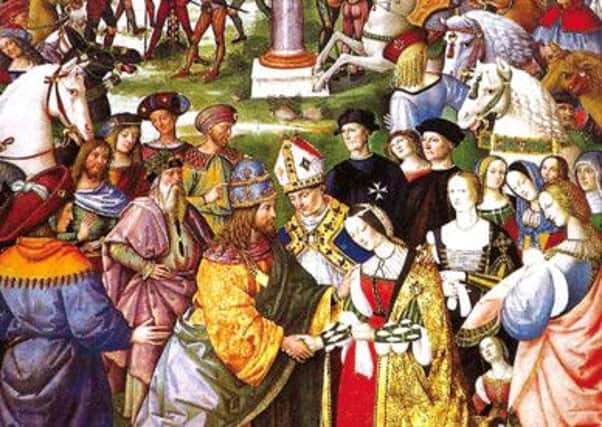Book review: Danubia by Simon Winder


Danubia: A Personal History Of Habsburg Europe
Simon Winder
Picador, £18.99
Under the dates 1802-1894, it commemorated “Lajos Kossuth, Hungarian Patriot” who, from the hotel balcony, was given an “enthusiastic reception” by the people of Selkirk. The idea of a connection between a founding figure of Hungarian nationalism and the town of Bannocks seemed faintly surreal. It is not half as surreal as the history of the region Kossuth came from.
The title of Danubia, a kind of companion piece to Simon Winder’s equally wry and erudite Germania, is judiciously chosen. It is not a history of the Holy Roman Empire (even though there was still technically a Holy Roman Emperor – Francis I, father of Marie Antoinette – when Voltaire made his quip that it “was neither holy, nor Roman, nor an empire”). Nor is it a history of the “Austro-Hungarian Empire”, which grew out of and was carved out from it. Nor is it a history of any of those anxious terms like Mitteleuropa, Central Europe or Eastern Europe, though it encompasses all of these.
Advertisement
Hide AdWinder charts the stories of both people and places from the point where Frederick III, of the House of Habsburg, became Holy Roman Emperor in 1452, through to the dissolution of the dynasty when Karl I “renounced participation” in political affairs in 1918 (subsequently the Blessed Charles of Austria – who is rapidly en route to sainthood, which would make him the only saint to have authorised the use of chemical weapons).
At one point or another, the Habsburgs controlled parts of modern day Austria, Belgium, the Czech Republic, Croatia, France, Germany, Hungary, Italy, Liechtenstein, Luxembourg, the Netherlands, Poland, Romania, Serbia, Slovakia, Slovenia, Spain, Switzerland and the Ukraine. The stereotype is of a vast swathe of little territories held together through delusional ritual splendour, bureaucratic lethargy, cakes and waltzes. The bulwark of opposition to the Ottoman Empire in the East and the Protestant Revolution within Europe, most histories of the Habsburg holdings take its end as inevitable and patiently chart the causes leading to that inevitability. A parallel trajectory – seen best in the writings of Joseph Roth – suffuses the crazy colloidal suspension of the Empire with a dim and golden light preferable to the lunatic nationalisms unleashed in the wake of the Empire’s fall.
Winder is an engaging host to these ideas. He tactfully expresses the exasperation any reader might feel in the post-Habsburg maelstrom of nomenclature: how Cluj, or Cluj-Napoca as it was renamed in the 1970s, is also Klausenburg and Kolozsvár, and how Bratislava is at the same time Preßburg or Pozsony. His narrative is frequently laugh-out-loud funny: take, for example, this askance view of the assassination of Archduke Franz Ferdinand – “His shooting skills made him legendary, belonging to that disgusting and depressing era when the aristocratic hunting expedition became married to a modern military technology, unbalancing the entire relationship between hunter and hunted, so that shooting partridges became like a proto-version of playing Space Invaders. Franz Ferdinand totted up the dazzling total of some 300,000 animals killed. The little woodland critters on his Bohemian estates must have indulged in a certain amount of high-fiving on receipt of the news from Sarajevo”. Someone should give Winder a TV series as soon as possible.
But the camp, clever narration belies a deep seriousness to this book. Like the House of Stuart – so well described by Allan Massie in his book on that dynasty – the Habsburgs had a persistence which is more astonishing than the comet-like brilliance of the Tudors, the Bourbons or the Kennedys. That they survived, even when the laws of primogeniture meant that Ferdinand I, a man blighted by the Habsburgs’ intermarriage police, became Emperor (the man who, on hearing of 1848 revolutions, asked Metternich “But are they allowed to do that?”) shows how tenacious they were.
The Habsburgs were, latterly, authoritarian liberals. They survived by guile and luck, by sheer chance and cold expediency. With the exceptions of figures like Rudolf II, that melancholy devotee of the occult, there are few of them one can imagine a novelist wanting to explore. Yet Winder rightly enthuses over the contribution this odd political amalgam made to culture: Haydn and Bartok, Klimt and Dürer, Musil and Schultz (and, after the event, Hrabal).
Danubia is astoundingly smart and negotiates the Scylla of elegy and the Charybdis of denunciation with expert skill. It’s also damn funny, and includes dodos, the banning of cribs, cockatrices and the entire history of Europe.